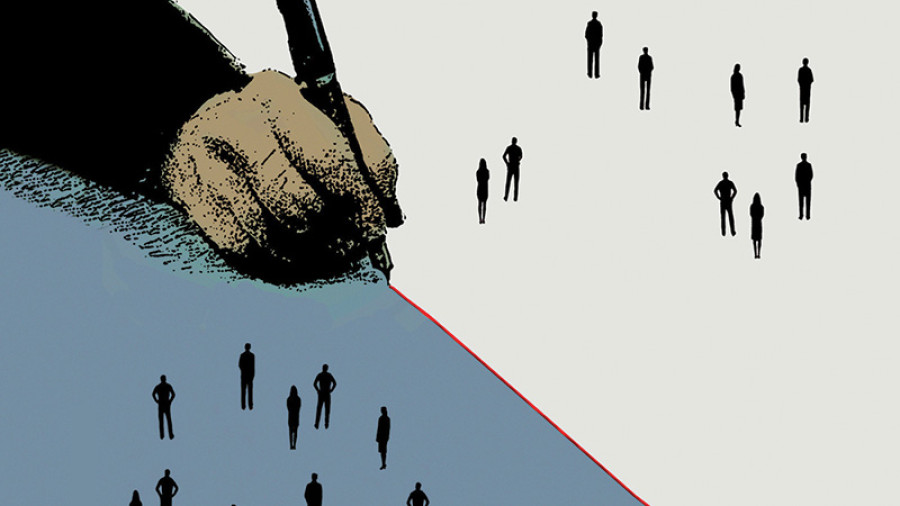Opinion
We shall overcome
Dalits still face discrimination due to state-protected ideology and undeclared exclusion in politics and profession
March 21 is a historical day for all marginalised communities and the people discriminated against around the world. It is celebrated as International Day for the Elimination of Racial Discrimination. Nepali Dalits have also been marking the day as Nepal is a signatory to the International Convention on the Elimination of All Forms of Racial Discrimination (ICERD) of the United Nations. This year, Dalits had formed a Joint Core Organising Committee to celebrate the special day with a united voice at the national level. Dalit civil society organisations, the Dalit NGO Federation, Joint Political Dalit Struggle Committee, Inter-Party Dalit Women Network and National Dalit Commission will be participating jointly in the celebrations.
The history of this special day goes back to March 21, 1960. It commemorates the killing of 69 anti-apartheid demonstrators by security forces at Sharpeville, a township south of Johannesburg in South Africa. The demonstrators were protesting against the ‘pass laws’, which prevented coloured people from moving around as they wished. The incident was able to get attention from around the world including that of the UN. In 1966, the UN General Assembly proclaimed March 21 as International Day for the Elimination of Racial Discrimination.
Ineffective platform
The discrimination and subjugation that black South Africans faced at that time is similar to the discrimination being faced by Dalits in Nepal. For more than a decade, Dalit organisations have been marking this day with a special emphasis on liberating Dalits from centuries-long discrimination and subjugation. Marking this day is important not only to create awareness among Dalits and non-Dalits but also to change the legal and policy apparatuses. The celebration should be seen as part of ‘history making process’ and ‘getting economic, political, social, educational and administrative power’ to legitimise the peaceful movement with the effective participation of Dalits.
However, the commemoration, whether we call it a celebration of history or a protest against the state’s exclusionary and discriminatory tendencies, has only been a formality. It has not been able to show its real power to make the ruling elite bow to their demands. The way of marking this day has been only a ‘process of ritualisation’ and ‘domestication’ and it is no longer a vibrant bargaining tool against the state.
The constitution states that Nepal is a secular federal democratic republic. The preamble envisions Nepal as being free from all kinds of discrimination including caste based discrimination. Article 24 provisions rights against caste based discrimination and untouchability, and Article 40 guarantees the rights of Dalits as fundamental rights. Article 255 has made the National Dalit Commission a constitutional body, and Article 282 provides the right of ‘proportional representation’ while appointing ambassadors and special emissaries. However, Article 47 states: “The State shall, as required, make legal provisions for the implementation of the rights conferred by this Part, within three years of the commencement of this Constitution.” This is a catch that deprives Dalits of their rights.
Going backwards
It appears that Dalit rights have been enshrined in the constitution, but in reality that is not so. From the view point of Dalit representation in the three branches of government, that is the executive, judiciary and legislative, the constitution seems to be regressive compared to the Interim Constitution of 2007, and there are many things that need to be reformed. Among the 884 members in the National Assembly, House of Representatives and Provincial Assemblies, there are only 61 Dalits. They make up only 6.90 percent of the total members even though they account for 13.8 percent of the national population.
Dalits face a two-pronged problem: Inhuman discrimination in their socio-cultural lives based on state-protected Hindu ideology, and undeclared exclusion in their politico-educational and eco-administrative lives. While celebrating International Day for the Elimination of Racial Discrimination, all Dalits must think properly and their demands must incorporate a fully proportional election system in the National Assembly, House of Representatives and Provincial Assemblies. Dalits must be represented in the three branches of government in a proportional manner too.
The educational, employment and entrepreneurship aspects of Dalits should be strengthened by proper legal and regulatory reform, and their political empowerment must also be backed up for proper inclusion in political positions. The discrimination and intimidation against Dalits as traditional ‘untouchables’ must be eliminated by effective enforcement of the Caste Based Discrimination and Untouchability (Offence and Punishment) Act, 2011. The National Assembly is a model where eight out of the 59 members (13.56 percent) are from the Dalit community. Such provisions need to be adopted at all state structures by amending and applying the existing constitution of Nepal.
Mijar is a member of the Joint Core Organising Committee and the programme coordinator at Samabeshi Foundation




 9.7°C Kathmandu
9.7°C Kathmandu









